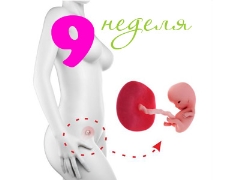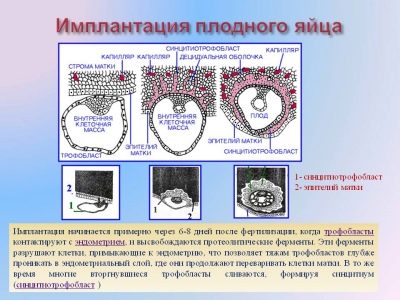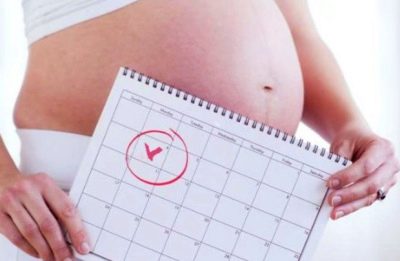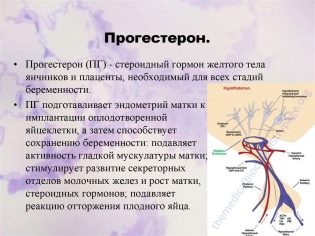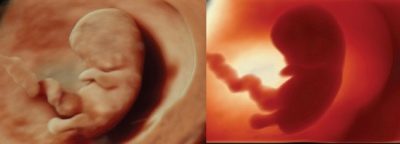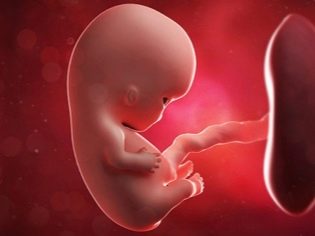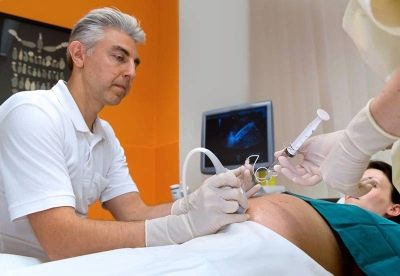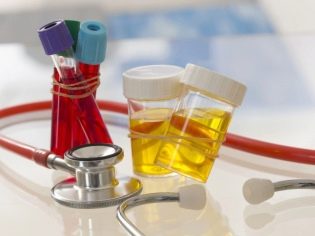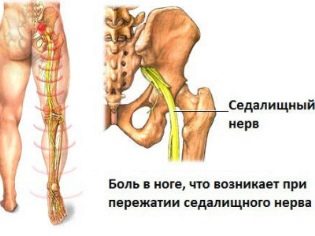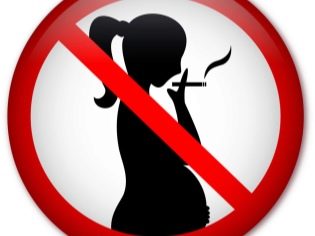Fetal development in the 9th week of pregnancy
Gestational age is considered to be in obstetric weeks. Throughout the pregnancy, the baby grows and develops, and changes occur in the body of the expectant mother. How does the fetus change at week 9? Answer the questions that worry future parents.
Nine weeks
A gestational period of 9 weeks corresponds to the end of the second and the beginning of the third month of pregnancy. The countdown in weeks in obstetric practice begins on the day of the last menstruation, which means a difference of about 2 weeks from the true gestational age. With a normal cycle duration of 28 days, ovulation occurs around day 14, from this point on, conception is possible.
But it is impossible to determine its exact moment, especially since it may be late, when, according to all calculations, the meeting of the egg cell and the spermatozoon is no longer possible, but for some women it happens. Also, sooner or later - with a difference of several days, the implantation of the ovum occurs in the wall of the uterus. Strictly speaking, this is the beginning of pregnancy, but it is also impossible to track this moment.
Therefore, in medicine it is customary to take the starting point of the last menstrual period as a starting point. This is reliable information, and a woman with a clear cycle - even more so. Knowing this date allows you to calculate not only the duration of pregnancy, but also the approximate date of delivery. Again, approximate, because usually the pregnancy lasts 280 days, If you count from the first day of the last menstruation. This corresponds to 10 lunar months, 40 weeks, or roughly nine calendar months.
The date of birth (DA) is called presumptive because the onset of labor and the time when the baby is born depends on many factors, starting from the moment when ovulation occurred and up to the mother's health, the effects of stress and drugs on her. Even modern science has not yet determined exactly what triggers the delivery mechanism.
What changes in the mother's body?
So, the ninth week of pregnancy is about 7 weeks from the date of conception. These 9 weeks bring many changes in the feeling of the future mother, but many changes remain unnoticed. Some women at 9 weeks of pregnancy do not even notice their new condition, although the corpus luteum already produces a sufficient amount of progesterone. This hormone, which is also called the pregnancy hormone, is responsible in the body of the expectant mother for many physiological processes. He is responsible for the onset of pregnancy, and for its preservation and successful course.
Progesterone relaxes the muscles of the uterus, prepares the mammary glands for lactation, affects the mood of a woman, making her less susceptible to external stimuli, calm, and sometimes even slightly inhibited.
External signs
At week 9, the abdomen is usually not yet visible to others, and the woman herself notes only a slight bulge above the bosom, the breast slightly increases in size, and sometimes painful sensations and small discharge from the nipples appear.All these are normal symptoms, indicating that the body adapts to the new state of a woman. But some women even at this time are not aware of their pregnancy, especially if it is the first pregnancy, and the woman has an irregular cycle.
At this time, a woman may already begin to gain weight. Normal gain does not exceed 1-2 kg, but in women suffering from early toxicosis, weight may, on the contrary, decrease due to the inability to eat properly and poorly digestible food.
Physiological changes
There are other changes that almost every woman notices. This change in taste preferences. There are a lot of stories on this subject, including funny ones. And these are not the whims of the future mother, who needs more attention. Women really want something unusual during this period, or those products that she didn’t like very much.
Everyone knows that the talk of pregnant women for salted food, cucumbers, fish and mushrooms, which has become the talk of the town. Doctors advise to eat the desired product, however, you should not get carried away with salty: it can lead to swelling and aggravation of the symptoms of toxicosis. Not worth it, yielding to desire, there is lime from the walls - this is also a common taste predilection for future mothers. Tell your doctor about it, and he will prescribe drugs that contain calcium.
Constipation is also a common problem for 9 weeks. Their appearance is associated with physiological processes, but, nevertheless, they must be fought with, taking mild laxatives as prescribed by a doctor. At 9 weeks, the appearance of small vaginal secretions of white or pale yellow color is considered normal.
If the discharge has acquired a brown color or there is visible blood in them, you need to consult a doctor, and immediately.
Early toxicosis
Many women in the ninth week of pregnancy have time to experience the charms of early toxemia: morning sickness, nausea, vomiting and an acute reaction to odors. A woman feels dizzy and sleepy. With strong manifestations of toxemia, it is imperative that you seek medical attention and not wait for it to pass by itself.
Symptoms do pass to the second trimester of pregnancy, but modern medicine can alleviate the condition of a woman with the help of effective and safe means for the child. Besides, toxicosis can also harm the child, so at the first symptoms you need to tell the doctor about them.
How does a child develop?
Of course, it’s interesting for future parents to know what is happening with a baby at 8–9 weeks old. It grows and by this time of pregnancy. fetus length already reaches 2.5 cm. This is about a small grape or cherry. It is freely located in the uterus. At the same time its weight is 4 grams. But, despite the small size, during the ultrasound, the baby can already distinguish between the face and the genital tubercle.
Also on the ultrasound, the doctor can see and tell the parents a lot of other useful information, as well as show the fruit on the monitor attached to the ultrasound sensor. The embryo at the 9th week of life looks like a man, clearly distinguishable are the head, the face with the nose and lips, the auricles, the little body, the arms and legs with small fingers. But the child has everything a little tail, and the proportions of the body are far from the proportions of an adult, and even a newborn. The head of the embryo is much larger and dominates the body.
The child develops muscles, so his movements become more coordinated. He can throw back his head, move his fingers, hands and feet. Also, the baby's liver begins to synthesize red blood cells, the ureters are visible, the kidneys are working, the lymphatic system is developing. An ultrasound clearly identifies the heartbeat of the embryo. During this period, the child’s brain is already starting to work, so the child moves in response to external stimuli.
The formation of the brain continues: the pituitary gland and the cerebellum appear.At the period of 9 weeks, the umbilical cord begins to work, which connects the organisms of the mother and the child, transfers to the embryo all the microelements and vitamins necessary for normal development, and also carries away the waste products of the fetus.
Boy or girl
A boy or a girl will be born - at this time no specialist will say, even using the most modern apparatus for ultrasound. The sex of the child is already determined, it occurs even at the moment of conception and depends on which sperm fertilizes the egg cell - with the Y or X chromosome. But the genitals of the child at 8-9 weeks of pregnancy are not yet developed. The doctor sees only the genital tubercle, and will be able to more accurately tell on the ultrasound after 14 weeks. By this time, the penis will develop from the genital tubercle - in the boy or the clitoris - in the girl.
If there are medical indications, for example, if there is a history of the father or mother of the unborn child having diseases that are transmitted only through the female or male lines, such as hemophilia, it is possible to determine the period by 9 weeks. But for this purpose invasive methods will be applied, that is, associated with penetration into the fetal bladder. Thus, in case of amniocentesis, a special needle is inserted into the amniotic space for fluid intake.
This manipulation is carried out in the hospital and represents a certain threat to the child. In some cases, a frozen pregnancy occurs after an amniocentesis or a spontaneous miscarriage occurs.
9 week tests
As a rule, at the 9th week of pregnancy, the woman already knows about her new condition and has decided to save the child. Therefore, this period is the best time to register for pregnancy in the antenatal clinic. or conclude a pregnancy management agreement with a private clinic. At the first admission, the doctor will collect anamnesis - detailed information about the state of health of the woman, previous pregnancies and their outcome. Also, if a woman does not know her group and rhesus of blood, the doctor will refer both her and her husband to an appropriate analysis in order to rule out the likelihood of a Rhesus-related pregnancy.
At week 9, a general analysis of blood and urine is done, as well as a biochemical blood test. Not be superfluous to check for toxoplasmosis, rubella, cytomegalovirus, blood test for HIV, syphilis and hepatitis. The doctor takes a vaginal smear to make tests for sexually transmitted infections: gonorrhea, chlamydia and some others.
Impressive women may get excited by a single listing of these diseases. However, there is nothing humiliating for the expectant mother. On the contrary, negative results will ensure that the baby is born healthy.
Many diseases are latent, that is, covertly, and future parents may not even be aware of their presence. But diseases can lead to deviations in the physical or mental development of the child, so such tests are appointed on a mandatory basis.
If a woman has not previously done an analysis for hCG, the doctor may prescribe it to confirm the normal development of the embryo.
Also, the 9th week of pregnancy is the optimal time for the first ultrasound. The child is already big enough to see many details of its development, including confirming a multiple pregnancy.
Possible complications
In addition to toxicosis, for nine weeks a woman may be disturbed by lower abdominal pain. Sensations of low intensity appear due to the fact that the uterus grows and begins to put pressure on other organs of the small pelvis. Usually this is accompanied by the appearance of constipation, increased gas formation. Abdominal pain may indicate the beginning of a miscarriage. Such pains are much more intense, sometimes are regular, cramping in nature and are accompanied by bleeding.
If these symptoms appear, a woman should receive medical attention as soon as possible in order to maintain the pregnancy.
Another possible complication is sciatica - pinching of the sciatic nerve. Most often, this condition occurs in multiple pregnancies, but it also occurs in singleton pregnancies. The uterus, increasing in size, puts pressure on the sciatic nerve. Because of this, women have pain in the lumbar region. As a rule, sciatica passes on its own when the uterus extends beyond the pelvis. The pressure on the sciatic nerve weakens, and the pain stops.
What can and can not mom?
In her new state, a woman is often afraid to make even an extra movement so as not to harm the baby. Her caution is understandable, but modern medicine does not consider pregnancy a disease. Women no longer need to spend all 9 months in bed, as it was once thought to be common. If the woman is healthy, and the survey showed that the child is developing normally, then the expectant mother, who is on the 9-week period, can lead a normal life with minor corrections to the pregnancy.
These amendments concern, first of all, alcohol intake and smoking. Best of all, if a woman stopped smoking and drinking alcohol at the preparatory stage for pregnancy, but if this does not happen, then you need to forget about bad habits, as soon as the woman learned about pregnancy. It is in the ninth week that the brain of the child is formed, and alcohol and nicotine can cause him serious harm. In addition, alcohol distorts the features of the unborn child, it is not born as beautiful as parents dreamed about.
During pregnancy, including the ninth week, the expectant mother is better to abandon the heavy physical activities associated with both professional activities and strength training. Russian legislation, protecting the future mother and child, provides for the transfer of women, whose work is connected with physical exertion, to a lighter one.
As for sports, future mothers are shown yoga, aqua aerobics and other non-power sports. Many sports centers offer special classes for pregnant women. Also, doctors recommend to abandon sports where it is likely to fall, for example, skating and downhill skiing. In pregnant women, the center of gravity shifts, so it becomes more difficult for them to control their body. At the same time, a strong fall can lead to placental abruption and loss of pregnancy.
Some changes need to be made in the diet. The forming organism needs calcium, iron, micro and macro elements and, of course, vitamins. He can receive them only from the mother's body. Therefore, women need to change the diet, preferring natural products. You need to eat more fresh vegetables and fruits, red meat, fish, and with their lack take special vitamins. But from taking drugs that are not prescribed by a doctor, you need to refrain.
At any indisposition, fever of the body above 38 C, you must immediately inform the doctor. He will prescribe drugs that are safe for the child.
On the development of the fetus in the 9th week of pregnancy, see the following video.
